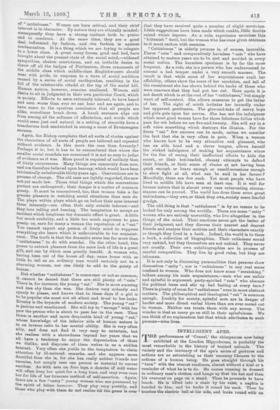"CATTISHNESS."
THE Bishop of London in a speech made at one of the Francis Holland Schools for Girls at the beginning of this month urged his hearers to avoid " cattishness." He regretted, he .said, "the 'catty' tendency current in the drawing. rooms of the West End." Is this tendency on the increase P Are the women of the upper classes more "catty" than they were P It is a matter for experts; we cannot say, We should have thought that the great social changes of the last few years had led women in the direction of other faults. We should have imagined that audacity and education had com- bined to put slyness and spite out of fashion. On the other hand, it is quite possible that the false appearance of toleranee which is cultivated to-day may result in an apparent increase of " cattishness." Women are born critical, and their chief • interest is in character. By nature they are ethically minded; I consequently they have a. strong instinct both to • praise' and to condemn. At the same time, , they are a good deal influenced by fashion, and . the fashion is against condemnation. It is a thing which we are trying to relegate to a lower class. A great. many forces, good and bad, have brought about the present state of the social mind,—widened sympathies, shaken convictions, and an irritable desire to throw off all the badges of Puritanism, those ornaments of the middle class which middle-class Englishwomen should wear with pride, in response to a. wave of social ambition caused • by a series of social earthquakes, resulting in the fall of the aristocratic citadel at the top of the social hill. Human nature, however, remains unaltered. Women still desire to sit in judgment in their own particular Court, which is society. Efforts to seem extremely tolerant, to have heard and seen worse than ever we can hear and see again, and to have come to the specious conclusion that all people are alike, sometimes break down. A harsh sentence slips out from among all the softness of affectation, and words which would seem just and natural in a setting of sincerity have a treacherous look sandwiched in among a mass of Brummagem excuses.
Again, the Bishop complains that all sorts of stories against the characters of all sorts of people are believed and repeated without evidence. Is this more the case than formerly ?
Perhaps it is; but it has to be remembered that where the smaller social scandals are concerned it is not so easy to judge of evidence as it was. More proof is required of unlikely than of likely occurrences. Many things are commonly done now, and are therefore believed upon hearsay, which would have been intrinsically unbelievable.thirty years ago. Conventions are in process of change. • The old ones are lightly.regarded, the new not yet made law. Those vital things which the conventions protect are endangered ; their danger is a matter of common gossip. It must be remembered, too, that women take a. far greater pleasure in watching social situations than men do.
The plays within plays which go on before their eyes interest them intensely—are often their only outside interest—and they love telling and hearing. The temptation to accept an incident which heightens the dramatic effect is great. A little too much credulity, and a little too much eagerness to pass gossip on, earn for many a woman the reputation of a "oat."
You cannot expect any person of lively mind to suppress everything she hears which is unfavourable to her acquaint- ance. The truth is that the dramatic sense has far more than "cattishness " to do with scandal. On the other hand, this Power to extract pleasure from the mere look of life is a great gift, and one by which men greatly benefit, A woman who, having been out of the house all day, came home with as little to tell as an ordinary man would certainly not be a charming woman, nor one likely to add to the gaiety of homes.
But whether " cattishness " is commoner or not so common, it cannot be denied that there are still plenty of "cats." There is, for instance, the young "cat." She is more amusing and less shy than she was, She desires very ardently and openly to please, and knows that in these days if a • girl is to be popular she must not sit silent and trust to her looks.
Rivalry is the keynote of modern society. The young "cat" is jealous and unashamed. She will try to "'savage" with her paw the person who is about to pass her in the race. Than there, is another and more despicable kind of young "oat," whose knowledge of the inferior side of human nature is in an inverse ratio to her mental ability. She is very often Silly, and does not find it very easy to entertain, but she realises with a shrewdness beyond her years that we all have a tendency to enjoy the depreciation of those we dislike, and dispraise of them wakes in us a sudden Interest., 'Very often she yields to the. temptation to claim attention by ill-natured remarks, and she appears more deceitful than she is, for she has, really neither friends nor enemies, but simply uses one person as material to amuse another. As with cats on four legs, a .douche of cold water will often keep her quiet for a long time, and may even cure
her for life of her tiresome, method of self-assertion. Again, there are a few "catty" young women who are possessed by the spirit of feline humour. They play very prettily, and those who play with them do not realise till the game is over
that they have received quite a number of slight scratches. Little suggestions have been made which rankle, little doubts raised which depress. As a rule, experience exorcises this " kittenish " devil, but the woman who has once given entrance toit must reckon with enemies.
" Cattishness " in elderly persons is, of course, incurable. Fierce "cats" and comparatively harmless "cats" who have attained to mature years are to be met and avoided in every social milieu. The harmless specimen is by far the more frequent. As a rule, she is a person who has endeavoured to conceal a bad temper under a very smooth manner. The result is that while some of her acquaintance exalt her affability, others show the scars of her scratches, and tall Qf
the resentment she has shown behind the backs of those who were unaware that they had put her out. Here again it is not deceit which is at the root of her " °elfishness," but simply want of self-control. She allows crossness to get the better of her. The sight of mirth irritates her inwardly under her apparent gentleness. The give-and-take of merry boys
and girls gets upon her nerves, She has not the indulgence which most good women have for those felicitous follies which pass for wit before we are five-and-twenty. She will say in a soft voice something which destroys the illusion. For the fierce " cat " few excuses can be made, unless we consider the fact that she is very often in pain. When 41 woman who knows how to be very attractive and pleasant, who has an able head and a clever tongue, allows herself the wicked indulgence of making her acquaintance wince for the fun of seeing their ineffectual efforts to hide the smart, or their hot-headed, clumsy attempts to defend their friends, or their sense of shame at not having been quick enough or brave enough or unself-consoious enough to show fight at all, what can. be said in her favour,? Meroifully, there are few such. Yet most people who have lived to middle life have seen at least one, Ibis well for human nature that in almost every case extenuating oireum- stances can be proved. The world has done them some great unkindness,—they owe, or think they owe, society some fearful grudge.
The odd thing is that "cattishness " is by no means to be looked for only among the worldly. There are some " catty " women who are entirely unworldly, who live altogether in the things of the mind. Their emotions never get the better of their judgment, and they dismiss their nearest and dearest friends and analyse their motives and their characters exactly as though they lived in a book. Indeed, the world is to them a book, a collection of biographies, Their criticisms sound very unkind, but they themselves are not unkind. They never act cruelly. Their own autobiographies are in process of careful composition. They live by good rules, but they are inhuman.
It is not only in discussing personalities that persons show themselves " catty "; nor is " cattishnese" in any real sense confined to women. Who does not know some " scratching " talkers among his male acquaintance,—men who' are unfair and spiteful in argument, party-spirited "oats" who obscure the political issue and stir up bad feeling at every turn? There is plenty of room for " cattishnese "even in more abstract matters. The philosophical and theological " cat " is common enough. Luckily for society, spiteful men are in danger of harder and more direct verbal blows than are ever meted out to women. Neither sex treats them with any mercy. The wonder is that' so many go on still in their spitefulness. We can think of no explanation but that which attributes to such persons—Dine lives.







































 Previous page
Previous page